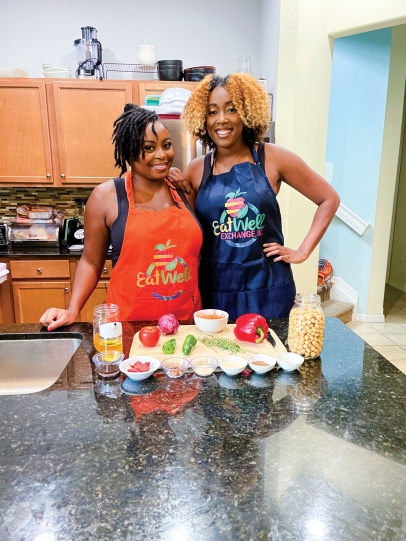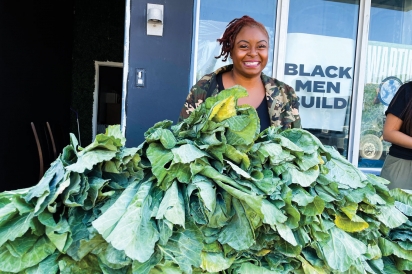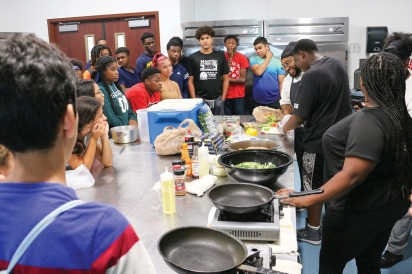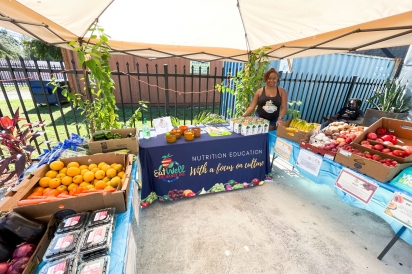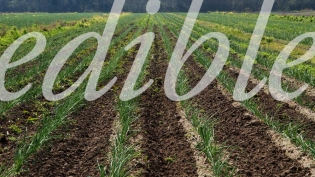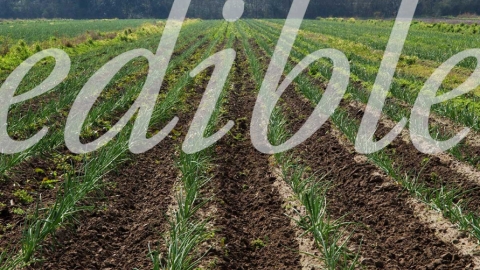From Your Roots to Your Plate
Eating more fruits and vegetables, limiting fried and starchy foods, cutting back on sugary sodas are all sound tips for anyone looking to eat a healthier diet. But kale may not be something your family grew up eating. The founders of Miami Gardens-based EatWell Exchange believe you can’t detach a person from their culture when it comes to foods – so they’re on a mission to teach folks to eat healthy with foods people actually like to eat.
In 2017, when local dietitians Ashley Carter and Jasmine Westbrooks launched their nonprofit, EatWell Exchange, their aim was to provide nutritional education to the populations that need it most, focusing on cultural foods. They work directly with communities through workshops and demos, and create partnerships with health professionals and policy makers, both locally and globally. Along the way, they have focused their attention to practical and meaningful education strategies that make sense in a diverse population like South Florida’s and well beyond.
“Several organizations come into our communities, rile everyone up, give out free food, and then leave. That doesn’t help our communities,” says Carter. “We focus on making changes that will last forever.”
Carter draws upon her own experience growing up in Liberty City, a food desert where few have access to fresh, affordable fruits and vegetables. “I didn’t grow up eating couscous,” she says. She remembers the corner store stocked with meat and chips and “probably one rotten banana,” she says. “So I grew up feeling that was the normal way of life.” To address lack of access, EatWell Exchange works directly in the communities, teaching families how to grow and cook their own foods and connecting them with community gardens.
Carter and Westbrooks have partnered with several organizations to bring their nutritional education to different audiences, where they have the opportunity to debunk nutritional myths. During a presentation to teenagers in the youth mentorship program of the Richmond-Perrine Alumni chapter of Kappa Alpha Psi Fraternity, Westbrooks told the audience that carbohydrates aren’t all bad – they provide energy, and certain carbs carry more nutritional value than others. “The next time we saw [the leader of the group], he switched his diet to more plant-based and healthy carbs,” says Westbrooks. In April 2019, at the Black Pepper Food Festival in Overtown, Carter joined culinary professionals on stage and cooked Brown Stew Chickpeas. A Jamaican woman approached her and said, “you know that Caribbean food is unhealthy.” When Carter replied that the dish, made with garbanzos, spices and other vegetables, is nutritious, the woman admitted she’d never heard of her foods being healthy. “We are going to be the people who will show you can take pride in your foods,” says Carter. “Everything that your family was doing was not wrong.”
When the pandemic arrived in 2020, EatWell Exchange delayed some of their plans, but they found new ways to serve those in need. “We switched our nutritional classes to virtual to stay connected with people,” says Westbrooks. “Ashley and I noticed this was a prime time where people were always on their phones. We posted about the classes and people picked up on it. This exposed us to people we couldn’t reach before.” They also went on Instagram Live to talk to medical professionals, reaching people in New York, Canada and the United Kingdom. “At the end of the day, we have a vulnerable community that needs us. If you had heart disease, diabetes or any medical condition, you were more susceptible to Covid,” says Carter. “We know that the education that we are putting out there can save a life.”
Their digital outreach combined with in-person work got the attention of some notable organizations in the world of nutrition. In June 2021, EatWell Exchange earned a $15,000 grant from WW, formerly Weight Watchers International, that they used to host a Thanksgiving food drive, donate healthy foods monthly to a community fridge, and provide a virtual gardening program. In fall 2021, they won $20,000 from yogurt-makers Siggi’s to host culinary academies and virtual cooking programs.
February 2022 marks five years since Carter and Westbrooks began EatWell Exchange. They want to continue to grow so everyone can be in touch with their culture. “If you learn more about your foods, that allows you to maintain your culture,” says Carter. “Maintain those foods in your diet, but do what you can to be healthier.”
Culturally Conscious Steps to Healthier Eating
Ashley Carter says you can keep your cultural foods and traditions on the table – just follow a few tips to make eating healthier.
Balance what you eat. Rice, breads and starches make up more than half of our meals at times. Our recommendation is to make rice 1/4 of the plate, and add more vegetables, including leafy greens like collard greens, callaloo and cabbage. Macaroni and cheese is another staple, and actually one of my favorites. Try to limit it to a quarter of the plate, since it’s a starch, and pair with vegetables and protein.
What about fried foods? Chicharrones, griot and other high-fat fried meats should make up a quarter of the plate. Cooking in a healthier oil, like avocado or grapeseed. Try to limit fried foods because when foods are fried it increases the fat content and decreases water content. Fried foods like plantain, chicken and chicharrones can all fit into your diet. These foods shouldn’t be consumed daily, but they do not need to be excluded from your diet, either. Plantains, a starchy vegetable, are also a great source of potassium, which is beneficial for heart health.
Don’t exclude foods you like, just focus on more nutrient-dense foods. Every culture has foods high in fat, sugar and sodium. Let’s focus on increasing nutrient-dense foods, like fruits, vegetables and whole grains.
Take small steps toward better health. Diets may cause you to drop pounds at a rapid pace, but that’s not sustainable. Add more vegetables to your plate, Swap out juices and soda for water when you can. Start with one meal and go from there. Eat foods you enjoy – just make half of the plate vegetables!
Eatwell Exchange
Find healthy recipes, videos and more information on their website.


